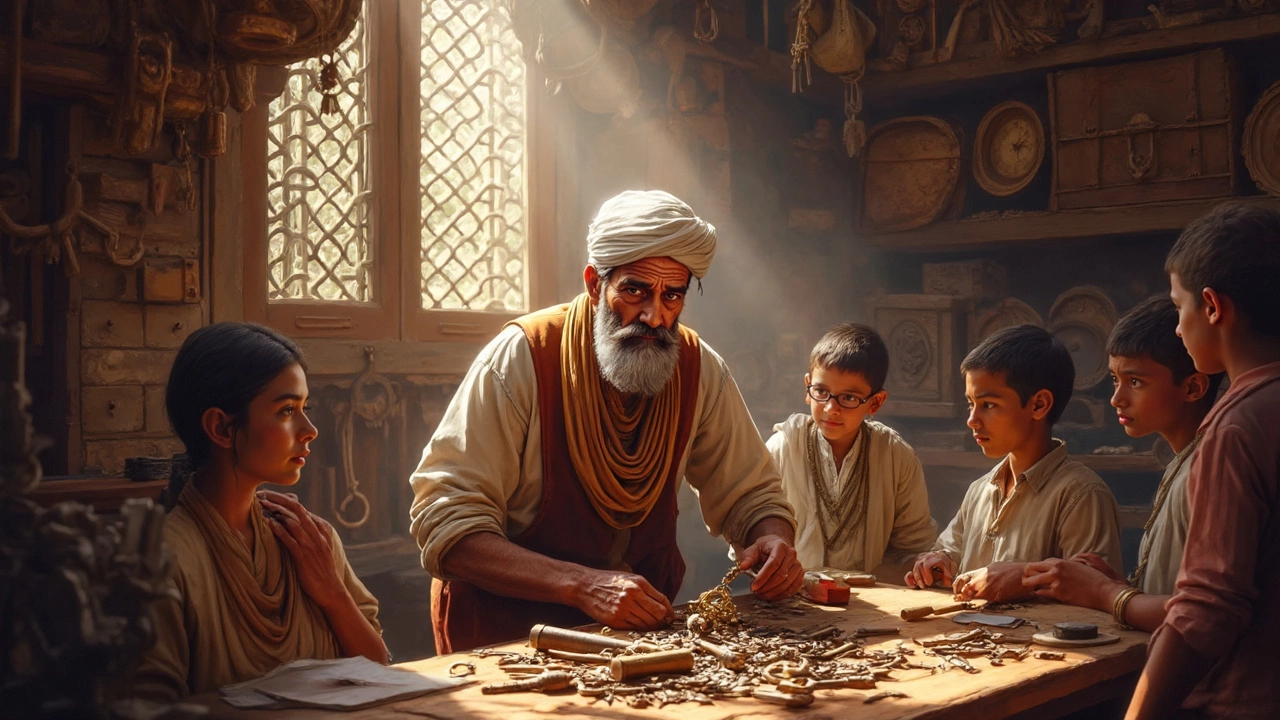If you ask ten people to name the world's greatest locksmith, don't expect one clear answer. The reasons are simple. This trade isn’t about having fame or a fancy business card. The true masters of the locksmith world are known for solving problems others can’t even attempt. Think picking the toughest locks, inventing new security tricks, and sometimes saving the day during emergencies.
But what sets a great locksmith apart from the rest? It’s not just quick fingers or tons of practice. It’s about creative thinking, an eye for tiny details, and lots of patience. Some of the best can open a high-security lock in minutes, all while knowing enough about electronics, metalwork, and even psychology to read a tricky situation. In places like India, where old and new tech mix together in people’s homes, true experts can fix up century-old locks or modern digital safes just as easily.
- What Makes a Locksmith Truly Great?
- Legendary Locksmiths and Their Stories
- Locksmith Training: Keys to Success in India
- Leveling Up: Tips from the World’s Best
What Makes a Locksmith Truly Great?
The difference between a good locksmith and a world-class one comes down to more than just opening doors. It’s a mix of technical skill, trustworthiness, and the ability to think fast when things get weird. Most top locksmiths started young and just never stopped learning. They keep up with changing lock technologies, tricky security systems, and tools that make the job faster and safer.
Here’s what you’ll usually find in a truly great locksmith:
- Locksmith training—lots of it. The best locksmiths put in thousands of hours learning on the job. Formal training helps, but real skills come from handling hundreds of actual locks.
- Attention to detail. A top locksmith spots things regular folks miss. Tiny scratches, slight angles, or a subtle click when a pin shifts—these are all clues for getting past even tough locks.
- Code of ethics. The job comes with trust. Customers often hand over access to their homes, cars, or safes. A great locksmith always puts honesty first, sometimes even turning down jobs that seem shady.
- Problem-solving skills. No two locks or security issues are exactly the same. The best locksmiths stay cool, work out options, and rarely get stuck for long.
- Knowledge of new and old tech. Especially in India, where houses can go from antique to smart-home within one street, the best can fix and install almost any kind of lock, digital or mechanical.
Check out this quick breakdown comparing the basics, good, and great locksmiths:
| Skill Level | Technical Know-How | Reputation | Tools Mastery | Ongoing Learning |
|---|---|---|---|---|
| Basic | Simple locks only | Mostly unknown | Basic tools | Not much |
| Good | Handles most home/business locks | Trusted locally | Most manual tools | Reads about new tech |
| Great | Solves rare and high-security issues | Known citywide or nationally | Manual and digital tools, makes own adjustments | Keeps updating skills, attends workshops |
So if you’re aiming to get into this trade or want to really stand out, focus on training, never stop learning, and always put trust first. It’s not a 9-to-5 job, either. Late-night calls, emergency situations, and the odd weird request are all part of what makes this career challenging—and kind of fun too.
Legendary Locksmiths and Their Stories
When you start digging into the world of locksmiths, a few names stand out. Houdini might come to mind—yes, the escape artist. Before he was famous for disappearing acts, Harry Houdini trained as a lock picker. He reportedly could open jail cell doors with nothing but a small bit of wire or even a shoestring. While he went for showmanship, his hands-on skills are proof that true locksmithing is as much about brains as it is about tools.
Then there’s Alfred Charles Hobbs, an English locksmith who made headlines in the 1850s. He traveled to the Great Exhibition in London and picked the famous Bramah and Chubb locks live, showing that no lock is unbeatable. Hobbs proved that even “unpickable” locks had a weak spot, sparking a rush to design better locks—and better training for locksmiths everywhere. His story is still brought up in locksmith courses, showing why learning from the past gives you an edge today.
Closer to home, India has had its own legends. For example, in old Delhi, some families have been locksmiths for over five generations, trusted by royalty to install locks in palaces and forts. These artisans didn’t just make keys—they invented their own tricky locking mechanisms. While their names may not be in global headlines, their work is famous among anyone serious about locksmith training in India.
The real takeaway from these stories? Mastery isn’t just about tools, it’s about a mindset. Each of these legendary locksmiths shared a drive to learn more, experiment, and push the limits of what “locked” even means. If you want to stand out, learning their stories is a good place to start—but putting their curiosity and patience into practice will take you even further.

Locksmith Training: Keys to Success in India
Getting started as a locksmith in India is more straightforward than you might think, but there’s a method to becoming great. You can’t just pick up a lock-pick set and hope for the best. Solid training gives you an edge, and right now, India’s growing mix of traditional and digital security means there’s real demand for skilled folks.
The biggest thing? Practical experience. Most top locksmiths in India learned by shadowing someone with years of street smarts. Whether through family businesses or apprenticeship with a local expert, hands-on learning is key. Some technical institutes—like The Skill India Mission and select polytechnic colleges in cities like Mumbai, Delhi, and Chennai—now offer formal short-term courses. These cover the basics: mechanical locks, rekeying, basic digital security, and safe handling. While it’s not a college degree, these certificates help with credibility and job offers.
Here’s what a typical locksmith training course in India covers:
- Lock mechanism fundamentals (deadbolts, padlocks, car locks)
- Lock-picking and bypass skills
- Rekeying and key-cutting
- Security systems (CCTV basics, digital locks)
- Safe opening and repair
- Customer handling and ethics
If you’re serious, invest in your own lock models and tools for practice. Practice on different brands—Godrej, Yale, Europa—because each one has a unique make that’s popular across Indian homes and offices. Many trainers will stress starting with low-cost locks and working up to imported, high-security brands.
Wondering about pay? The numbers speak for themselves. Check out this table with stats based on 2023 industry surveys:
| Experience Level | Monthly Earnings (INR) |
|---|---|
| Entry-Level Apprentice | ₹8,000 - ₹15,000 |
| Full-Time Locksmith | ₹20,000 - ₹40,000 |
| Specialist/Trainer | ₹50,000 and up |
In this business, reputation matters just as much as technical skill. The locksmith who shows up on time, protects customer privacy, and charges fairly is the one everyone calls back. Don’t jump steps—practice, invest in upskilling, and always keep an ear out for new gadgets and trends in the security world.
Leveling Up: Tips from the World’s Best
If you want to become the kind of locksmith people call for impossible jobs, you’ve got to go beyond the basics. The world’s best share a few things in common and stick to habits that make a big difference—both in skills and reputation.
- Practice with Real Locks: Theory is fine, but the best locksmiths spend hours with physical locks. Pick up used locks from scrap shops and practice opening, rekeying, and fixing them. Legendary Indian locksmith Amir Chander once said he broke open at least 200 different locks before he trusted his own skills.
- Learn Modern and Old-School Techniques: Master the old stuff like warded locks, but also stay up to date with digital safes and biometric systems. Famous UK locksmith Ken Stanley keeps both a classic lockpick and a USB-based hacking tool in his everyday kit.
- Stay Legal and Ethical: Top locksmiths always keep records, ask clients for ID, and never take shortcuts. High standards build trust—and that means more opportunities.
- Network with Pros: In India, groups like the All India Locksmith Association organize events where you can meet pros and share tips. Real connections matter if you want to learn the ropes fast.
- Invest in Good Tools: Cheap picks might save a buck but will slow you down. Even entry-level good-quality tools last longer and make your work cleaner and easier.
Some stats worth knowing: According to the Indian Skilled Trades Report 2024, locksmiths with formal training earn up to 40% more than self-taught ones. The top 10% of locksmiths take home over ₹60,000 per month, thanks to specializing in vehicle security and digital lock systems.
| Tip | Impact |
|---|---|
| Practice Daily | Improves speed and accuracy — crucial for emergency jobs |
| Upgrade Tools Annually | Keeps you prepared for new lock technologies |
| Take Advanced Courses | Boosts pay scale by 25%, per latest trade association data |
| Build Client Trust | Leads to more referrals — almost 50% of top earners rely on this |
No fancy degrees needed, but a real passion for learning. The most respected locksmiths treat every lock as a puzzle. So, try to learn something new each week, keep your tools sharp, and always act with honesty. That’s how you level up—and maybe earn your own legendary status one day.



